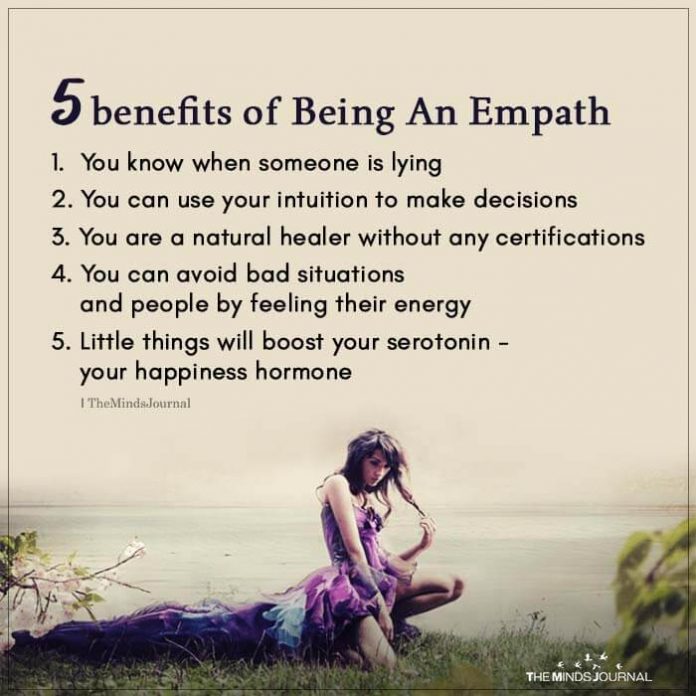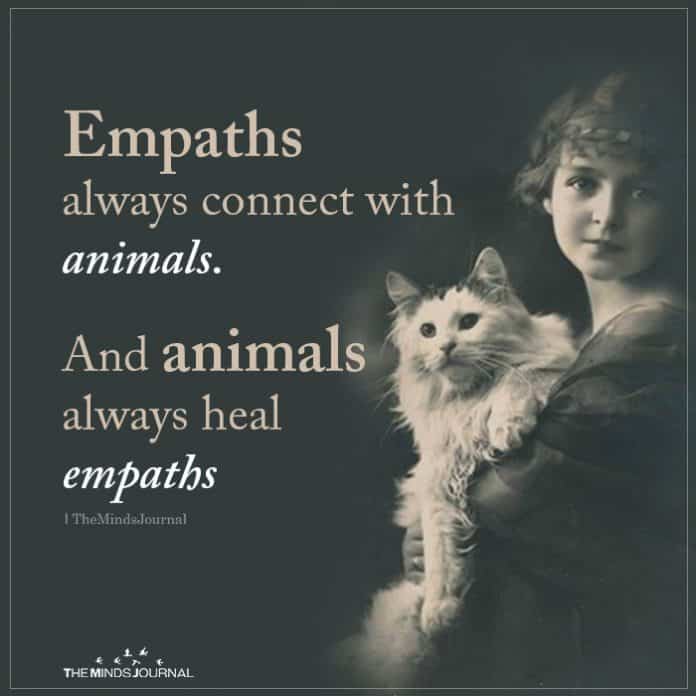Empaths have now been scientifically proven to be more prone to anxiety, especially social anxiety and depression.
To be an Empath means you have the intuitive ability to interpret other’s emotions.
Related: How Empaths Can Recover from Trauma And PTSD
However, while interpreting these other’s emotions, it’s very easy to take them on and let them affect you negatively. Soon, anxiety and depression set in, and life gets way harder than it needs to be. Here’s how to prevent that vicious cycle.
Being Empathic means you have a very powerful gift, the ability to feel what other people feel and use that emotion for good.

This can make you a better communicator, a proactive humanitarian, proficient at marketing or simply support you in being a person who naturally understands others needs and feelings.
All gifts that we possess as humans come with great responsibility. Being an Empath is no different.

So, what’s your responsibility? To move through the emotion that gets bottled up in your body.
Since we were children most of us were told to stop crying, be quiet, sit still and shut-up. When we expressed our emotions, we were told to cut it out. Years of this behavior leads to us stifling our natural expression, and in time we become disconnected from our True Selves.
While everyone needs to express their Emotions, Empaths have a much greater responsibility than others? Why? Well, they aren’t just processing their emotions, they are processing others’ emotions as well.
As an Empath, here are several big tips that will truly support you in preventing anxiety and depression, as well as make great progress in living a happy, healthy & fulfilling life.

5 Tips To Prevent Anxiety And Depression As An Empath
1. CREATE MOVEMENT
I was once told that the majority of people have a backlog of unintegrated emotions and life experiences. The primary reason for that backlog? Emotional constipation.
People simply aren’t giving themselves permission to healthily channel and express the emotions that need to move through their bodies. There is a compounding effect to this emotional constipation. One layer after layer of social anxiety and depression stack up on top of each other and are programmed into our mind & body, life becomes a constantly threatening avalanche of downward spirals.
The solution? To Express Emotion = Energy in Motion
We have to be willing to actually live our lives, and that starts by being brave enough to feel. Ever notice when a friend of yours who is depressed stays in bed watching dramatic movies or tv endlessly. Why? Well, they are secretly craving the emotional expression they are witnessing others have.
Related: How Empaths Can Recover from Trauma And PTSD
There are two ways to approach this. Create motion in your life by exercising, going on adventures or simply mixing up the monotony of your daily life. The other way is to literally practice creating a safe space to express your emotions, which I talk about in the next tip…
2. PRACTICE CATHARSIS
The actual very definition of Catharsis is the process of releasing and thereby providing relief from, strong or repressed emotions. It’s worth sharing this is a scientific, psychological understood principle, not just pseudo-spiritual science bs.
Here’s the thing: Repressed Emotions = De-Pression
The more repressed emotions you are dealing and contending with, the much greater likelihood that you’ll be dealing with depression. The Cure = Expression
Catharsis can happen naturally or can be provoked. Anytime you are crying, screaming, shaking or even lots of laughing, you are releasing. The idea is to become more comfortable at releasing. One way to do that is to provoke catharsis and emotional release.
When I do this, I like to have a private space all to myself. Sometimes it’s in the car, bathtub or alone in my room. I like to cleanse the space and say a little intention. Then I start shaking, tapping pressure points (EFT), and simply start allowing my emotions to rise up and move through my body. Sometimes I weep or get really angry, experience immense joy, and usually, it’s a combination of it all. Try it for yourself!
3. TALK TO YOUR EMOTIONS
Did you know there is something called Emotional Literacy? Literally, there is an entire science developed to the ability to understand, interpret and relate to your feelings. In fact, it was listed in as one of the core competencies in the book “Know Yourself.”
Related: The 11 Emotional Energy Centers In Our Body: How They Affect Us
So here’s a big secret. There is a firm limit on how far you can evolve spiritually and within your personal development if you’re not emotionally literate. This is especially important for empaths, as you aren’t just navigating your own emotional landscape, but you navigating everyone else’s as well. Better to have a map than be lost in the great watery depths.
Once you can identify and get to know your own feelings and emotions, you can start to create a dialogue. It could like like this:
“I feel angry & upset…Hmm, this is trying to show me something.
Anger, what are you trying to show me?
Oh, that I feel secretly sad. Why am I sad?
Oh, I am missing something..
What’s missing?
I am not getting enough time to be creative in my own space.
I need to be alone and be creative.
How do I feel? Better now. I’ll create that space tonight.”
You’ll be amazed at how much you can receive by simply creating a dialogue and asking questions to yourself.
4. KEEP A CLEAR CONTAINER
Often our external reality can reflect our internal World. What we are feeling inside can manifest outward in our lives. As an empath, you must be extra careful with this, as if you are taking on other’s emotions and internalizing them, then you can be seeing other people’s emotions governing your life.
Anxiety can easily come about when we are worried or uneasy about something, especially in the future. Often, this has to do with how we are relating to the natural uncertainty we have in our lives, which can lead to us feeling out of control.
To prevent these bouts of anxiety, consider the what things you are in control of….your internal self and your surroundings. So keep your internal & external space clean, clear & organized!
Also read: Music Therapy for depression – how can it heal you?
I start each day with cleaning my room and house, it symbolizes the inner-cleanliness I am working to maintain in my mind, body, and heart. Whether the container is you or your own space, you’ll be so surprised how keeping things well maintained, can truly support keeping you level-headed.
5. ASK FOR HELP & ENERGETIC SUPPORT
Lastly, and often most important of all, ask for help. As an empath, it’s not just a negative emotion that you are sensitive to picking up. I’d even dare say positive emotion is much more highly infectious.
Do you want to know the power of highly sensitive people? Watch this video:
To prevent anxiety and depression, become familiar with the triggers of when you feel like it’s creeping in. And when you barely start to experience that trigger, that’s exactly when you want to ask for help.
Remember, help comes in a lot of forms. For instance, calling your friend to let them know you feel an emotional funk coming on and you want some positive energy to uplift your spirits, so you go on a hike together. Boom, depression averted, and you go spend time in nature, which is one of the best tools to prevent and treat depression and anxiety.
Also, as an empath, you are going to be extra-sensitive to energetic support, so remember you can call on your friends to send you prayers and blessings, and you can soak up that good energy to break through those walls.
Here’s to the upwards Spirals of You as an Empathic Super Hero!
Are your emotions getting in your own way? Often, the issue is Resistance. And if you learn how to break through resistance, you’ll never be held back for too long.
What are other ways you could prevent anxiety and depression? Leave a comment below.











Leave a Reply